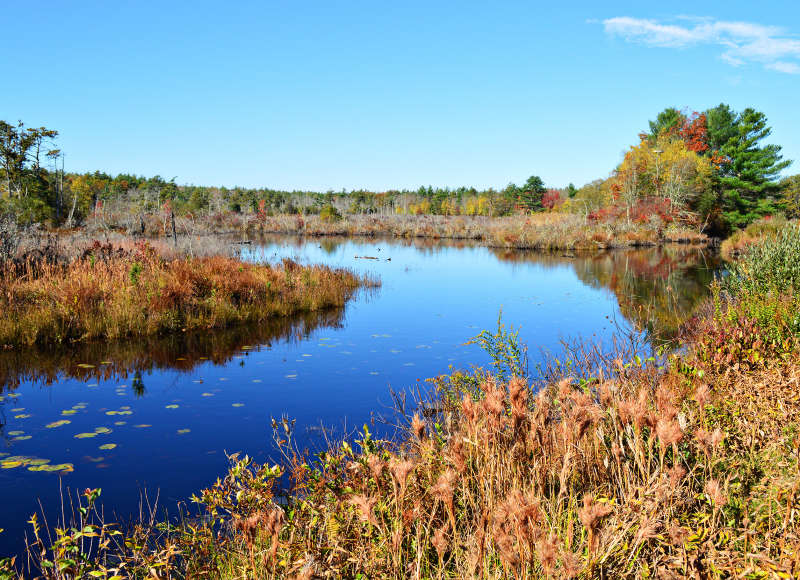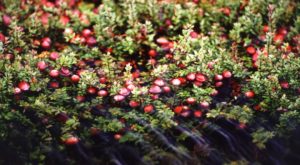On April 23, 2020, the Commonwealth of Massachusetts was awarded $10 million from the United States Department of Agriculture Natural Resources Conservation Service (NRCS) to support a partnership-based effort to protect open space and restore streams and wetlands on former cranberry bog farmland in the southeastern part of the state.
“As we celebrate Earth Week in the Commonwealth, we recognize the importance of our local agricultural industry as well as protecting and conserving Massachusetts’s natural resources,” said Governor Charlie Baker. “The cranberry industry has been a part of the state’s history and landscape for over 200 years, and this grant builds on the recommendations of the Cranberry Revitalization Task Force by supporting growers while also restoring important habitat for fish and wildlife and increasing resilience to climate change.”
“In addition to helping cranberry growers, this funding will bring new opportunities for local communities to access the outdoors,” said Lieutenant Governor Karyn Polito. “Many of the projects included in this partnership include long-term management of restored wetlands and wetland buffers for recreation, including walking, hiking, and nature observation.”
The Massachusetts Department of Fish and Game’s Division of Ecological Restoration (DER) and 17 partner organizations will use the funding to work with landowners to protect and restore historic wetlands on retiring cranberry farmland in Massachusetts. The partnership aims to restore 900 acres of wetlands and permanently protect 1800 acres of open space. The proposed work will restore habitat for fish and wildlife, help communities adapt to climate change, and benefit cranberry growers.
In 2016, the Cranberry Revitalization Task Force’s final report recommended providing exit strategies for growers that also provided solutions to environmental issues in the region, including through wetland restoration.
“River and wetland restoration are nature-based strategies that help communities and ecosystems adapt to climate change,” said Energy and Environmental Affairs Secretary Kathleen Theoharides. “Protected river corridors and low-lying bogs provide a future inland migration route for salt marshes in response to climate change, and future inland marsh expansion will help mitigate habitat losses along the immediate coastline with rising seas.”
The grant was awarded by the NRCS Regional Conservation Partnership Program (RCPP), which supports community- and partner-driven approaches to fund innovative solutions to natural resource challenges.
“I’m excited to announce that this major wetland restoration project led by DER is among the first RCPP awards under the 2018 Farm Bill,” said Dan Wright, NRCS State Conservationist for Massachusetts. “Through collaboration and aligning our resources toward a common goal, we’re making an impact for natural resource conservation that could never have been realized on our own.”
“The Cape Cod Cranberry Growers’ Association (CCCGA) is a core member of this partnership and is ready to be part of this dynamic project,” said Brian Wick, Executive Director of CCCGA. “There is increasing interest from Massachusetts cranberry growers that are considering retiring some or all of their bog acreage. Having this kind of “exit strategy” program helps struggling farmers while creating permanently protected open space and valuable wetlands for local communities.”
The NRCS funding will support seven projects that are already part of DER’s Priority Project Program in Plymouth, Falmouth, Freetown, Mattapoisett, Rochester, Wareham, and Harwich. An additional 13 projects will be selected in southern Massachusetts through a competitive process.
Restoration and land protection project sites may be owned by cranberry farmers, municipalities, land trusts, or other public or private organizations.
“I want to congratulate the Department of Fish and Game’s Division of Ecological Restoration for their hard work by securing $10 million from the USDA for our Commonwealth,” said State Senator Ryan Fattman (R-Sutton). “It is great to see public and private organizations come together to work to restore wetlands and streams on retired cranberry bogs. Being such a vital part of our economy, it is important to ensure a viable means of transition of this farmland out of active production.”
“We are fortunate to have a robust Division of Ecological Restoration that has been a good partner to our communities and conservation groups,” State Senator Anne Gobi (D-Spencer). “These funds will assist them with their mission to support our precious aquatic ecosystems.”
In addition to NRCS and the CCGA, other partners include the Buzzards Bay Coalition, Nantucket Conservation Foundation, Mass Audubon, Living Observatory, UMass Amherst, Mt. Holyoke College, Woods Hole Research Center, United State Geological Survey, The Nature Conservancy, Southeastern Regional Planning and Economic Development District, US Fish and Wildlife Service, MA Office of Coastal Zone Management, MassWildlife, and Ducks Unlimited.
DER and its partners anticipate starting the five-year land protection, river, and wetland restoration project in the fall of 2020.
Featured photo of The Bogs is courtesy of the Buzzards Bay Coalition.


